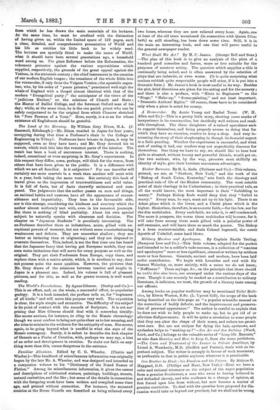The Land of the Morning. By William Gray Dixon, M.A.
(J. Gemmell, Edinburgh.)—Mr. Dixon resided in Japan for four years, occupying during that time a Professor's ohair in the College of Engineering in Tokeyti. Professors have leisure in Japan, it may be supposed, even as they have here; and Mr. Gray devoted his to travels, which took him into the remotest parts of the interior. The result has been a book of uncommon interest. There is nothing, indeed, sensational or even surprising in Mr. Gray's experiences. In this respect they differ, some, perhaps, will think for the worse, from others that have been given to the public. It is a difference with which we are all familiar. Is it subjective ? For one traveller will certainly see more marvels in a week than another will meet with in a year, both taking the same route. But certainly this book of travel gives us the impression of trustworthiness and solid value. It is fall of facts, but of facts shrewdly estimated and com- pared. The judgments that the author passes on men and things, on national habits and customs, have all the appearance of reason- ableness and impartiality. They lean to the favourable side, nor is this strange, considering the kindness and courtesy which the author almost uniformly met with, even in his remotest journeys. Bat there is nothing of blind partiality. About his own special subject he naturally speaks with clearness and decision. The chapter on "Japanese Students" is peculiarly interesting. The ex-Professor describes them as industrious, acute, gifted with ex- ceptional powers of memory, but not without some counterbalancing weaknesses and defects. They are somewhat shallow ; they are better at imitating than at originating; and they are disposed to overrate themselves. This, indeed, is not the first time one has heard that the Japanese fancy that having got European models, they can soon make imitations that will serve for every purpose as well as the original. They get their Professors from Europe, copy them, and replace them with a native article, which, it is needless to say, does not possess quite the same qualities. However, the pictures that Mr. Gray draws of the relations between teacher and taught in Japan is a pleasant one. Indeed, his volume is fall of pleasant pictures, and for this, as well as for graver reasons, is well worth reading.


































 Previous page
Previous page